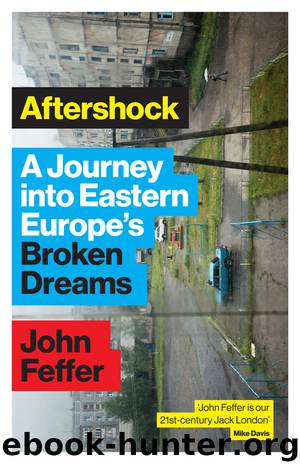Aftershock by John Feffer

Author:John Feffer
Language: eng
Format: epub
Publisher: National Book Network International
Published: 2017-04-06T04:00:00+00:00
Changing things locally
They are called the decret generation. During the communist era in Romania, Nicolae Ceauşescu issued Decret (Decree) 770 in 1967, making abortion and contraception illegal except under certain circumstances. The communist leader wanted to radically increase the population of the country. Those with money or political influence found a way around the regulations. Parents who could not support their new babies often dropped them off at the nearest orphanage.
That was the fate of Vasile Mathe when he was a baby. Now a soft-spoken man, he works as a school mediator in a small town outside of Câmpia Turzii in Transylvania. Of all the people I’d met in the region, he’d overcome the greatest odds in his efforts to reinvent himself.
‘Until I was three years old, I was raised by a lady working in the maternity ward,’ he told me as we sat with a translator in a café in Cluj. ‘She wanted to adopt me. But it was impossible because my mother wouldn’t agree to the adoption. We had to wait until I was ten years old. So, I was sent to an orphanage because of this disagreement with my mother. I ended up staying there until I was nineteen years old.’
This experience has made him more philosophical than bitter. He was, of course, lucky enough to come of age just as the Romanian system was changing, so that he could realize his dream of helping children. In addition to working as an educator at an orphanage, he earned a degree in psychology and assisted NGOs devoted to education and Roma rights. He has used his artistic skills to inspire children in hard-luck situations. As a mediator in a school attended largely by Roma, he tries to stand up for the rights of children.
‘My goal was to persuade parents to keep their children at school,’ Vasile told me. ‘Working with Roma children who were already going to school, I managed to convince the others also to send their children because of the good results at school. It didn’t happen all the time. But I did manage to bring some of the other children back to school.’
It wasn’t easy work because many of the teachers were not on the same page. ‘The teachers are not prepared to invest more effort to give Roma children an education,’ he continued. ‘The children have a lower competence. They feel inferior. So, they already are psychologically ready to quit school.’ In many conscious and unconscious ways, teachers were encouraging Roma children to drop out, for instance by threatening to fail them unless they did better. This was, as Vasile pointed out, a form of abuse, which pushed Roma students to drop out. ‘The children might not even realize that they are being abused,’ he added, ‘but they all react in some way.’
The teachers at the school responded to the monitoring program Vasile tried to put in place by effectively kicking him out of his office. He ended up conducting his parent–teacher meetings and after-school programs outside, in the school courtyard.
Download
This site does not store any files on its server. We only index and link to content provided by other sites. Please contact the content providers to delete copyright contents if any and email us, we'll remove relevant links or contents immediately.
| Anthropology | Archaeology |
| Philosophy | Politics & Government |
| Social Sciences | Sociology |
| Women's Studies |
The Secret History by Donna Tartt(16681)
The Social Justice Warrior Handbook by Lisa De Pasquale(11495)
Thirteen Reasons Why by Jay Asher(7810)
This Is How You Lose Her by Junot Diaz(5805)
Weapons of Math Destruction by Cathy O'Neil(5058)
Zero to One by Peter Thiel(4841)
The Myth of the Strong Leader by Archie Brown(4797)
Promise Me, Dad by Joe Biden(4462)
Beartown by Fredrik Backman(4447)
How Democracies Die by Steven Levitsky & Daniel Ziblatt(4430)
Stone's Rules by Roger Stone(4427)
The Fire Next Time by James Baldwin(4357)
100 Deadly Skills by Clint Emerson(4095)
A Higher Loyalty: Truth, Lies, and Leadership by James Comey(4045)
Rise and Kill First by Ronen Bergman(4029)
The David Icke Guide to the Global Conspiracy (and how to end it) by David Icke(3900)
The Farm by Tom Rob Smith(3884)
Secrecy World by Jake Bernstein(3793)
The Doomsday Machine by Daniel Ellsberg(3743)
